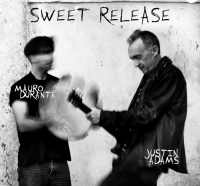
 Justin Adams and Mauro Durante
Justin Adams and Mauro DuranteSweet Release Ponderosa Music and Records Review and interview by George De Stefano
 An Anglo-Italian duo makes an album that impresses critics, delights the artists’ fans, and wins prestigious awards. The music is a unique synthesis of diverse styles, Southern Italian, North African, Middle Eastern, blues, folk, rock ‘n roll. The sound is driven by rhythm yet rich in melody. The two musicians’ virtuosity dazzles, but their technical prowess is at the service of mood, atmosphere, and feeling. The songs, the grooves. You’ve heard elements of the duo’s sound in their own projects, but their collaboration blends them to produce something wonderfully original that’s more than the sum of their parts.
An Anglo-Italian duo makes an album that impresses critics, delights the artists’ fans, and wins prestigious awards. The music is a unique synthesis of diverse styles, Southern Italian, North African, Middle Eastern, blues, folk, rock ‘n roll. The sound is driven by rhythm yet rich in melody. The two musicians’ virtuosity dazzles, but their technical prowess is at the service of mood, atmosphere, and feeling. The songs, the grooves. You’ve heard elements of the duo’s sound in their own projects, but their collaboration blends them to produce something wonderfully original that’s more than the sum of their parts.
That album was Still Moving, by the British guitarist Justin Adams and the Italian violinist and percussionist Mauro Durante, who specializes in the pizzica music of his native Puglia region. Released in 2021 to virtually unanimous critical praise, the album ended up on many global music best-of lists and was voted Best Fusion album in Britain’s 2022 Songlines Music Awards. Adams and Durante put in a lot of roadwork to promote the record, touring the UK and Europe. In 2023, they performed in NPR’s Tiny Desk miniconcert series, and, in early 2024, at the New York club Le Poisson Rouge. Those gigs honed the collaboration and took it to a higher level, and the proof is their second album, Sweet Release. No sophomore jinx here; the synchrony they achieve on the album is even more seamless and captivating than their debut.
The seeds of the duo project were planted in 2011 when Durante and Adams met and performed at the Notte della Taranta festival. The festival showcases Salento’s pizzica, a traditional, rhythm-driven music whose distant origins lie in trance rituals. Adams was unfamiliar with pizzica, but he quickly took to it. Like Durante, he was fascinated by trance-inducing rhythms and their healing power. With CGS, Durante has gained global recognition for Salento’s pizzica music with excellent albums that honor tradition while reinventing it with Arabic, Indian, Anglo and Italian folk, with Western pop and Salentine roots. The Adams-Durante no-borders aesthetic is fully realized on the ten tracks that make up Sweet Release. These songs have surprises, with shifts in meter and melody, pensive moods turning turbulent, moments when the sound is fuller than you might expect from a duo and others when the players employ a minimalist approach to space. Adams and Durante have written all the songs except for “Wa Habibi,” a lament made famous by the Lebanese singer Fairuz. The title track offers a theme for the album—the healing power of music when life’s struggles and contradictions seem too much to bear. I got a heartbeat, but I’m running out of time
The rhythmic interplay between the players, with Adams working the desert blues style, the insistent throb of Durante’s tamburello and its dancing cymbals, evoke a cathartic “sweet release” and also pizzica’s healing power—“rhythm is the cure”—as the saying goes. Adams sings lead, but then Durante comes in with a vocal that seems to echo from another world. “Leuca,” titled after a beautiful coastal town (Santa Maria di Leuca) in Durante’s Salento, opens with Adams’ chiming guitar; the pensive introduction gives way to a rhythmic shift into pizzica, with Durante’s CGS bandmate Alessia Tondo joining him on vocals. The furiously rocking “Ghost Train” mixes Saharan desert blues, blues rock, and pizzica, with Adams and Durante sharing the vocals. This train is not bound for glory; it’s a nightmare of a ride they want to end. “I wanna get off and get out of this story,” Adams sings; Durante echoes the desperate sentiment: “Fermu a quai nu te puei salvare” (Stuck here, you can’t save yourself).
“Wa Habibi,” a Good Friday lament originally recorded in 1967 by Fairuz, features a poignant vocal by Yousra Mansour of the Moroccan-French rock band Bab L’Bluz and a gorgeous violin solo by Durante that’s quite different—more Arabic than Salentine—from his work with CGS. The instrumental “Ithaca Return” is another showcase for Durante’s violin. There’s no percussion but rhythm galore as Durante takes us on a wild leap into the pizzica stratosphere. “Qui Non Vorrei Morire” (I Would Not Like to Die Here”), a ballad (somewhat reminiscent of CGS’ “Solo Andata”) set to verses by the Salentine poet Vittorio Bodini, was originally recorded by Durante’s late father Daniele, a leading figure in Salentine music and the pizzica revival that began in the 1970s. His son’s personal connection to it manifests in a heartfelt rendering of the melancholic lyrics.
On “Tide Keeps Turning,” a blues set to Neapolitan tamurriata rhythm. Felice Rosser, a bassist and singer from Detroit now based in New York, provides soulful vocal accompaniment to Adams’ lead voice. Sweet Release ends with “Santu Paulu,” a prayer to Saint Paul, the patron saint of the tarantate, those who, in the mythology of tarantismo, suffer physically and spiritually from spiders’ supposedly poisonous bites and find catharsis (or sweet release) in dancing to the rhythms of pizzica. Adams’ guitar, Durante’s vocal—at first solemn and then soaring—and the pulsing tamburello beats create a stark, mysterious mood for this plea to be granted the “grace” to cope with and rise above life’s tribulations.
George De Stefano talked with Adams and Duante in late October of 2024
Find the artists online:
Mauro Durante Justin Adams
Further reading:
Search RootsWorld
|